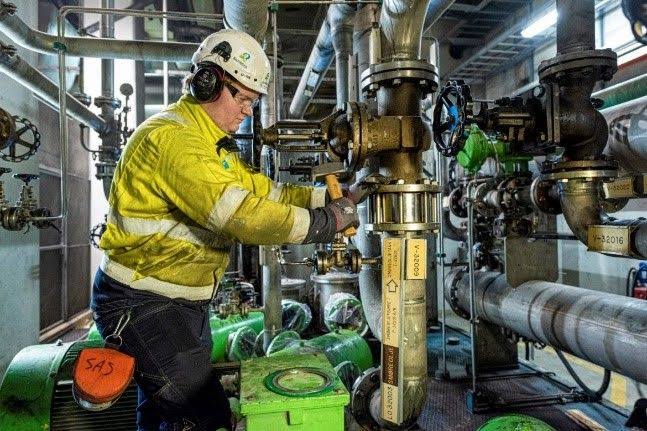Course Training
PetroNorth PN have international enriched experience of developing workforce for companies and have subject matter experts to train and develop the company employees. We are providing various trainings, including;
- IOW System
- Operational Excellence (OE) Assessment
- Plant Inspection
- Storage Tank Inspection
- Quality Control & Quality Assurance
- NDT (conventional & advance techniques)
- Fire & Safety

DETAILS ON TRAINING OF
API 584 INTEGRITY OPERATINGWINDOWS (IOWs) FOR INSPECTION,CORROSION, RBI, AIMS & PSM
INSTRUCTOR’S PROFILE
- 25+ years’ experience of working in corrosion, integrity, RBI and Our inspection function of Oil & Gas Industry. Worked as subject matter is expert on mechanical integrity issues of the process plants/ facilities. Enriched with risked based inspection, fitness for service Assessments, managing integrity operating windows, formulation of
- Inspection strategies, implementing corrosion monitoring and control
techniques . - developing inspection procedures and vetting management of change. Worked as advisor for finalizing typical repair procedures.Bachelor degree in Mech.
- Engineering & Master degree in Management API Certs 580, 571, 510, 570 & 653

API 584 INTEGRITY OPERATING WINDOWS (IOWs) FOR INSPECTION, CORROSION, RBI, AIMS & PSM
COURSE INFORMATION
5 days Course
The purpose of this course is to develop improved understanding on integrity operating windows (IOWs) and how it can effectively be utilized for managing Integrity of in-service process plants, utilities and offsite facilities, which is critical for inspection, corrosion control, RBI, asset integrity management (AIM) & process safety management (PSM).
The course helps participants understand the concepts, development and implementation of an effective IOW Program for Process Facilities. It helps maximize the potential for success in availing the benefits of IOWs in strengthening inspection, corrosion, RBI, AIMS & PSM Programs.
COURSE OBJECTIVE
- Understanding the
concepts of Integrity
Operating Windows
(IOWs). - LOW Work
Process & Risk
Ranking - IOW Development, and
General Considerations
for Establishing IOWs and
Their Limits. - Updating Integrity
Operating Windows
(IOWs) - Roles, Responsibilities &
Accountabilities of IOW
Program - Barriers in
implementation of a
successful IOW Program.
- Relevant Documentation,
Implementation, and
Training needs for IOW
Program. - Monitoring and
Measuring IOW
Parameters - Examples of Potential
Process Variables for
IOWs - Automation of IOW
System - Integration of IOW
Program with other Work
Processes including
Inspection, Corrosion
Management, RBI, AIMS
& PSM - Performance Monitoring
of the IOW Program
COURSE SPECIFICS
Contributive in improving effectiveness of inspection, corrosion management,RBI, AIMS & PSM Programs
WHO SHOULD ATTEND
This course is designed for anyone who has a desire to develop good understanding on Integrity Operating Windows and wishes to create a climate for using IOWs as part of inspection, corrosion management, asset integrity (AIM) and process safety management (PSM) program, such as people and professionals from;
- Inspection
- Asset Integrity
- Process Safety
- Maintenance
- Corrosion
- Process Engg.
- Engineering
- Projects
- RBI
- Operation
- Reliability
This course is under the training initiative to provide knowledge base to develop effective workforce for further improving the integrity system as positive contribution towards getting excellence in reliability and safety of process plants, utilities and facilities.
COURSE PROGRAM
The following program is planned for this course. The instructor may modify the program for practical and technical reasons. However, the course objectives will be met as described.
DAY (01)
- 07:30 – 08:00 Registration & Coffee
- 08:00 – 08:30 Welcome & Introduction
- 08:30 – 09:30 Integrity Operating Windows (IOWs) Definition, Fundamentals & Concepts, How it is different from short term damages.
- 09:30 – 09:45 Break
- 09:45 – 11:30 IOW Work Process
- 11:30 – 12:30 Lunch & Prayer Break
- 12:30 – 13:45 Considerations for Establishing IOWs
- 13:45 – 14:00 Break
- 14:00 – 15:00 Selection of Integrity Operating Windows
- 15:00 – 15:30 Recap. End of Day One
DAY(2)
- 07:30 – 08:00 Coffee
- 08:00 – 09:30 Process & Consideration to Set IOW Limits
- 09:30 – 09:45 Break
- 09:45 – 11:30 IOW Risk Ranking & Classification
- 11:30 – 12:30 Lunch & Prayer Break
- 12:30 – 13:45 Developing IOW Program
- 13:45 – 14:00 Break
- 14:00 – 15:00 Resources Required for Implementation of IOW Program
- 15:00 – 15:30 Recap. End of Day Two
DAY(3)
- 07:30 – 08:00 Coffee
- 08:00 – 09:00 Skills & Training Requirements
- 09:00 – 09:30 Relevant Documentation
- 09:30 – 09:45 Break
- 09:45 – 11:30 Integration of IOW Program with other Work Processes (Process DataHistorical System, RBI, AIMS, PSM, etc.)
- 11:30 – 12:30 Lunch & Prayer Break
- 12:30 – 13:45 Roles, Responsibilities & Accountabilities of IOW Program
- 13:45 – 14:00 Break
- 14:00 – 15:00 IOW Program Implementation
- 15:00 – 15:30 Recap. End of Day Three
DAY(4)
- 07:30 – 08:00 Coffee
- 08:00 – 09:00 Setting KPIs for IOWs
- 09:00 – 09:30 Measuring & Monitoring IOW Performance/Compliance
- 09:30 – 09:45 Break
- 09:45 – 11:30 Damage Assessment of Non-compliant IOWs
- 11:30 – 12:30 Lunch & Prayer Break
- 12:30 – 13:45 Follow Up Inspection & Damage Monitoring
- 13:45 – 14:00 Break
- 14:00 – 15:00 Updating Integrity Operating Windows (IOWs)
- 15:00 – 15:30 Recap. End of Day Four
DAY(5)
- 07:30 – 08:00 Coffee
- 08:00 – 09:00 Examples of Process Variables to be used as IOWs for Process Units
- 08:30 – 09:30 Exercise to Select Integrity Operating Windows & Their Limits
- 09:30 – 09:45 Break
- 09:45 – 11:30 Benefits & Advantages of IOW Program
- 11:30 – 12:30 Lunch & Prayer Break
- 12:30 – 13:45 Barriers in Successful Implementation of IOW Program
- 13:45 – 14:00 Break
- 14:30 – 15:00 Course Conclusion & Recap
- 15:00 – 15:30 Presentation of Certificates. End of Course
Other Trainings
1- Operational Excellence
2- API Certifications
3- NACE Courses
4- Corrosion Under Insulation Inspection
5- Focused Inspection Program
6- Risked Based Inspection
7- Damage Mechanisms
8- Corrosion Severity Analysis
9- Corrosion Risk Assessment Study
10- Corrosion Control Documents
11- How to Improve Inspection Effectiveness
12- Optimized Inspection Planning
13- Conventional NDT Methods (PT, MT, UT & RT)
14- Advance NDT Techniques
15- Fire & Safety Trainings
